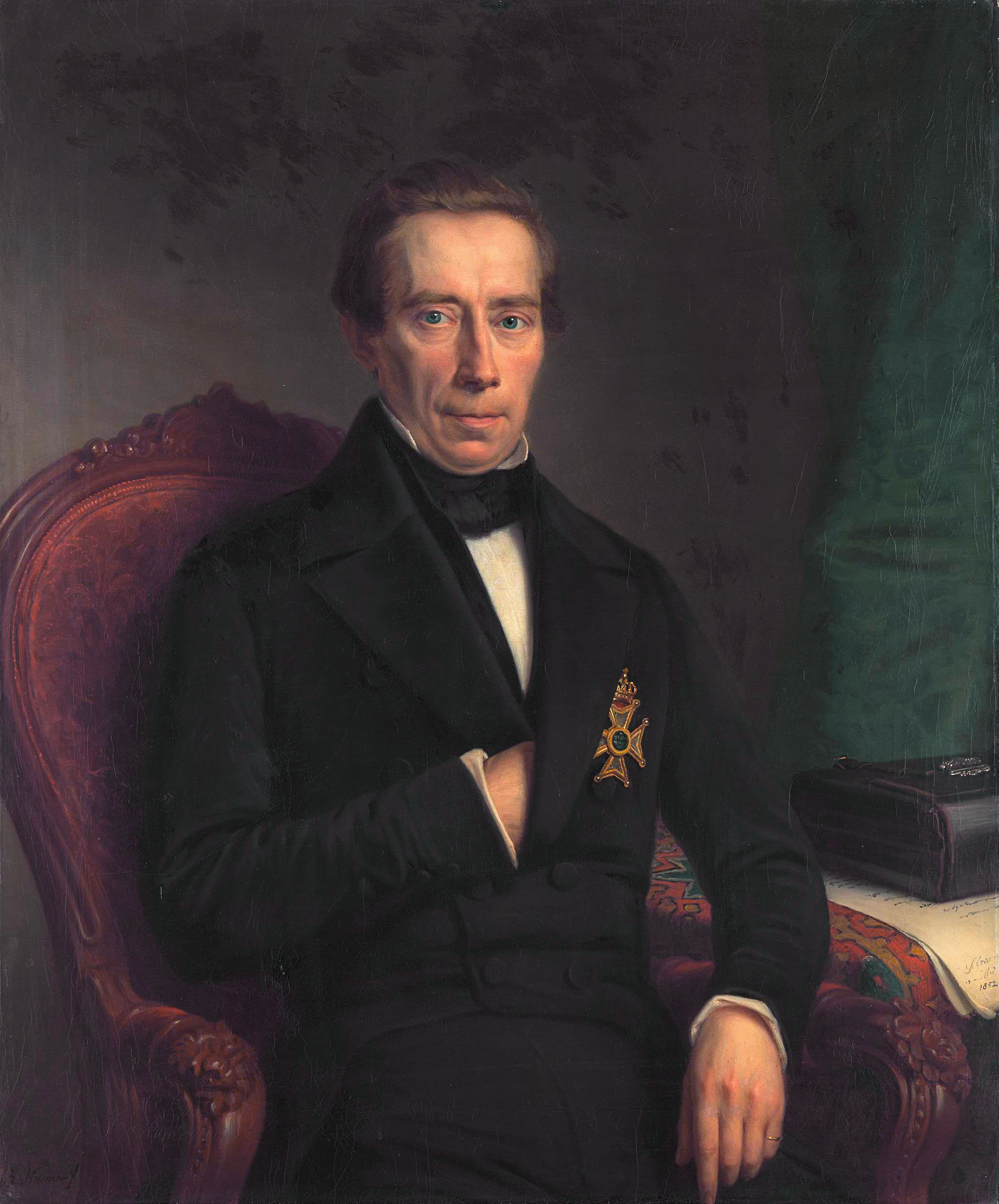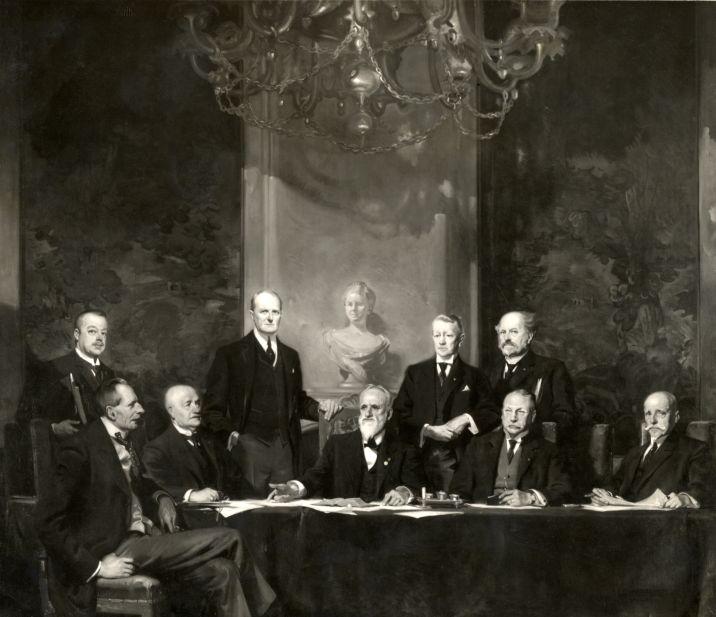|
Antithesis (Netherlands)
The Antithesis ( nl, Antithese) is a conflict between Christian democracy in the Netherlands , Christian democratic, confessional parties, united in the Coalition (Netherlands), Coalition and Liberalism in the Netherlands, Liberal parties, united in the Concentration (Netherlands), Concentration between 1888 and 1918. The conflict concerned the School struggle (Netherlands), equalisation of payment for religious schools. The realisation of this necessitated a constitutional revision, which needed the support of two-thirds of both houses of parliament. Both political parties held about fifty per cent of the MPs, however. The issue was forced by Anti-Revolutionary Party leader Abraham Kuyper, who hoped that an alliance of Catholics and Protestants would gain the necessary number of seats, but this strategy failed. The issue was finally resolved in the Pacification of 1917.. See also * Pillarisation References Political history of the Netherlands Political terminology {{Netherla ... [...More Info...] [...Related Items...] OR: [Wikipedia] [Google] [Baidu] |
Christian Democracy In The Netherlands
This article gives an overview of Christian democracy in the Netherlands, which is also called Confessionalism (politics), confessionalism, including political Catholicism and Protestantism. It is limited to Christian democratic political party, parties with substantial support, mainly proved by having had a representation in parliament. The sign ⇒ means a reference to another party in that scheme. History Christian democracy is the second oldest political ideology in the Netherlands, although before 1977 it was called "Confessionalism (politics), confessionalism" (politics based on the Christianity, Christian confession). Christian democracy in the Netherlands is separated by roughly two kinds of cleavages—religion in the Netherlands, religious cleavages and politics of the Netherlands, political cleavages—which sometimes coincide. The strongest religious cleavage is between Catholicism in the Netherlands, Catholicism and Protestantism. Before the 1920s Catholics were tr ... [...More Info...] [...Related Items...] OR: [Wikipedia] [Google] [Baidu] |
Coalition (Netherlands)
The Coalition is a historic coalition between three confessional parties of Netherlands - the Christian Historical Union, Anti-Revolutionary Party and Roman Catholic State Party. They were united in their common struggle for equal financing for religious schools. They were opposed to the Concentration. The Coalition governed between 1888 and 1891, led by Æneas Mackay, 1901 and 1905 led by Abraham Kuyper, 1908 and 1913 led by Theo Heemskerk and between 1918 and 1940 led by several politicians, Hendrikus Colijn, Dirk Jan de Geer and Charles Ruijs de Beerenbrouck Charles Joseph Marie Ruijs de Beerenbrouck (1 December 1873 – 17 April 1936) was a Dutch politician of the defunct Roman Catholic State Party (RKSP), later formed to the Catholic People's Party (KVP) now merged into the Christian Democratic A .... Political history of the Netherlands {{Netherlands-hist-stub ... [...More Info...] [...Related Items...] OR: [Wikipedia] [Google] [Baidu] |
Liberalism In The Netherlands
Liberalism in the Netherlands started as an anti-monarchical effort spearheaded by the Dutch statesman Thorbecke, who almost single-handedly wrote the 1848 Constitution of the Netherlands that turned the country into a constitutional monarchy. In contemporary politics, there are both left and right-wing parties that refer to themselves as "liberal", with the former more often espousing social liberalism and the latter more often espousing liberalism. A common characteristic of these parties that they are nominally irreligious, in contrast to the traditionally dominant and still popular Christian democracy. In the contemporary economic situation, even though the markets for basic needs services like food and clothing are still subject to economic liberalism, this is not the case in housing, in child education, health care and payment services. For example the health care system does not satisfy basic requirements for being a market economy because in the distribution of goods and s ... [...More Info...] [...Related Items...] OR: [Wikipedia] [Google] [Baidu] |
Concentration (Netherlands)
The Concentration was a coalition of Dutch liberal parties between 1901 and 1918. The Vrijzinnig Democratische Bond, Liberale Unie and the Bond Vrije Liberalen participated. The main issue which united these parties was universal suffrage and their opposition to equal financing for religious schools. The Concentration governed between 1905 and 1908, led by the Theo de Meester with support of the social-democratic SDAP and 1913 and 1918 led by Pieter Cort van der Linden in an extra-parliamentary cabinet The cabinet of the Netherlands ( nl, Nederlands kabinet) is the main executive body of the Netherlands. The current cabinet of the Netherlands is the Fourth Rutte cabinet, which has been in power since 10 January 2022. It is headed by Prime Minis .... In 1921 two of the component parties, the League of Free Liberals and the Liberal Union form the Liberal State Party, the Freedom League. 1901 establishments in the Netherlands 1918 disestablishments in the Netherlands Political ... [...More Info...] [...Related Items...] OR: [Wikipedia] [Google] [Baidu] |
School Struggle (Netherlands)
The school struggle (Dutch: ''de schoolstrijd'') is a historical conflict in the Netherlands between 1848 and 1917 over the equalization of public financing for religious schools. French period The struggle began during the French occupation of the Low countries. In 1795 the French introduced the separation of church and state. Due to this, education became a matter of the state. Prior to this, the Dutch Reformed Church had most power over education for centuries. The French did not forbid Christian schools, but they needed permission of the government, which was not given in all cases. Funding of Christian schools was out of the question. Religion was not completely banned from education, however. 19th century up to 1848 In the law on schools (''schoolwet'') of 1806 it was stated that public schools should educate for ''all Christian and civil virtues''. Many Protestants thought this basis not sufficient. Especially the later Anti-Revolutionary politicians Guillaume Groen van P ... [...More Info...] [...Related Items...] OR: [Wikipedia] [Google] [Baidu] |
Anti-Revolutionary Party
The Anti-Revolutionary Party ( nl, Anti-Revolutionaire Partij, ARP) was a Protestant conservative and Christian democratic political party in the Netherlands. The party was founded in 1879 by Abraham Kuyper, a neo-Calvinist theologian and minister. In 1980 the party merged with the Catholic People's Party (KVP) and the Christian Historical Union (CHU) to form the Christian Democratic Appeal (CDA). History History before 1879 They anti-revolutionary parliamentary caucus had existed since the 1840s. It represented orthodox tendencies within the Dutch Reformed Church. Under the leadership of Guillaume Groen van Prinsterer the anti-revolutionaries became a real political force, which opposed the liberal tendencies within the Dutch Reformed Church and the liberal tendencies within Dutch politics. Their three values were "God, the Netherlands, and the House of Orange". An important issue was public education, which in the view of the anti-revolutionaries should be Protestant-Ch ... [...More Info...] [...Related Items...] OR: [Wikipedia] [Google] [Baidu] |
Abraham Kuyper
Abraham Kuyper (; ; 29 October 1837 – 8 November 1920) was the Prime Minister of the Netherlands between 1901 and 1905, an influential neo-Calvinist theologian and a journalist. He established the Reformed Churches in the Netherlands, which upon its foundation became the second largest Calvinist denomination in the country behind the state-supported Dutch Reformed Church. In addition, he founded the Vrije Universiteit Amsterdam, the Anti-Revolutionary Party, and a newspaper. In religious affairs, he sought to adapt the Dutch Reformed Church to challenges posed by the loss of state financial aid and by increasing religious pluralism in the wake of splits that the church had undergone in the 19th century, rising Dutch nationalism, and the Arminian religious revivals of his day which denied predestination. He vigorously denounced modernism in theology as a fad that would pass away. In politics, he dominated the Anti-Revolutionary Party (ARP) from its founding in 1879 to his death ... [...More Info...] [...Related Items...] OR: [Wikipedia] [Google] [Baidu] |
Pacification Of 1917
The Pacification of 1917 was a political agreement between liberals and socialists on the left and some Christian parties on the right in the Netherlands, ending both the suffrage issue and the school struggle. The Christian parties involved would later present themselves as "Christian-democrats". Process and agreement The suffrage issue and the school struggle were issues that had dominated Dutch politics in the previous decades. When the liberal Cort van der Linden cabinet took office in 1913, it vowed to resolve both issues. A state committee tasked with finding a resolution to the suffrage issue was instituted on 15 November 1913. Although led by the liberal professor Jacques Oppenheim, it included members from all parliamentary parties and movements of the time, seeking a compromise that could rely on broad support. A second state committee for the school struggle was instituted on 31 December. It was led by the progressive liberal member of the House of Representatives D ... [...More Info...] [...Related Items...] OR: [Wikipedia] [Google] [Baidu] |
Pillarisation
Pillarisation (from the nl, verzuiling) is the politico-denominational segregation of a society into groups by religion and associated political beliefs. These societies were (and in some areas, still are) vertically divided into two or more groups known as pillars (Dutch: ''zuilen''). The best-known examples of this have historically occurred in the Netherlands and Belgium. Each pillar may have its own social institutions and social organizations. These may include its own newspapers, broadcasting organisations, political parties, trade unions, farmers' associations, banks, stores, schools, hospitals, universities, scouting organisations and sports clubs. Such segregation means that many people have little or no personal contact with members of other pillars. Netherlands The Netherlands had at least three pillars, namely Protestant, Catholic and social-democratic. Pillarisation was originally initiated by Abraham Kuyper and his Christian Democratic and neo-Calvinist ('' ... [...More Info...] [...Related Items...] OR: [Wikipedia] [Google] [Baidu] |
Political History Of The Netherlands
The politics of the Netherlands take place within the framework of a parliamentary representative democracy, a constitutional monarchy, and a decentralised unitary state.''Civil service systems in Western Europe'' edited by A. J. G. M. Bekke, Frits M. Meer, Edward Elgar Publishing, 2000, Chapter 7 The Netherlands is described as a consociational state. Dutch politics and governance are characterised by a common striving for broad consensus on important issues, within both of the political community and society as a whole. Constitution The Dutch Constitution lists the basic civil and social rights of the Dutch citizens and it describes the position and function of the institutions that have executive, legislative and judiciary power. The constitution applies to the Netherlands, one of the four constituent countries of the Kingdom of the Netherlands (along with Aruba, Curaçao and Sint Maarten). The Kingdom as a whole has its own Statute, describing its federate political ... [...More Info...] [...Related Items...] OR: [Wikipedia] [Google] [Baidu] |





.jpg)